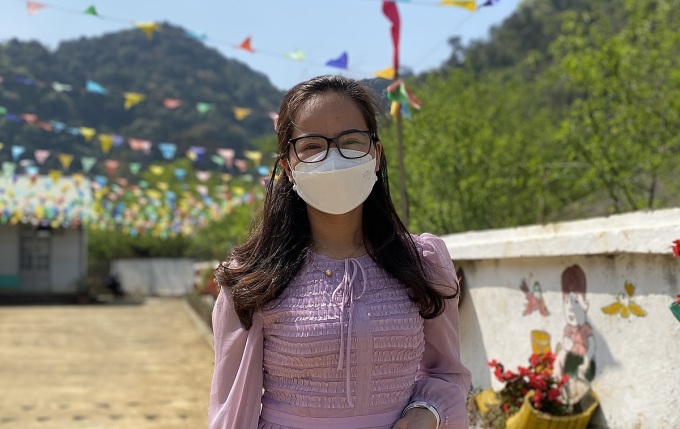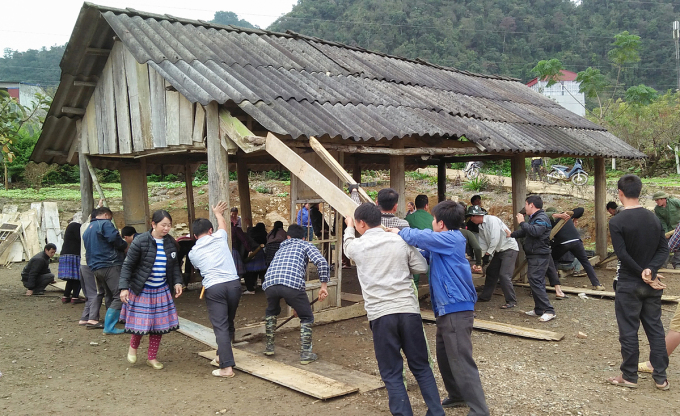Just out of college then, Le Thi Van vividly remembers the fear within as she first visited the notoriously drug-infested Long Luong Commune. Her task: convince children to attend school.
Memories flooded her mind early last month when 38-year-old Van visited the Long Luong Kindergarten in Long Luong, northern Son La Province, where she worked from 2008 to 2016.
She, now vice-principal of the Song Khue Kindergarten in Van Ho District’s Song Khue Commune, in the province, was assigned to Long Luong right after graduating from the local pedagogical university.
She reached Lung Xa Village after walking for more than two hours through a forest. On the way, she had to tackle a steep slope while carrying a backpack full of lesson plans and a bag of dried fish and roasted peanuts.
Despite her fear, young Van was idealistic and full of enthusiasm. “I was determined to ensure that all children in the village did not miss out on school.” It was only after she got to the place that she realized the magnitude of the problem.
In many areas, dropping out of school early was the norm, because children were left to fend for themselves, working in the fields to grow food or taking care of younger siblings. Frequently, the father was in prison for some drug-related offences.
 |
|
Le Thi Van returns to the Long Luong Kindergarten in the commune of the same name in Son La Province, March 7, 2022. Photo by VnExpress/Quynh Nguyen |
All schools in the commune had very poorly constructed classrooms. Teachers lived and taught students in a wooden house that was built on damp ground, with no electricity, water, toilers or phone service. During the day, teachers relied on sunlight and used kerosene lamps for light when it got dark outside.
Teachers had to use their lunch break taking cans to a nearby stream to get water for drinking and daily use. Some even used their spare time to grow vegetables to add nutrition to the daily meals.
While she taught in a remote area against tough odds, Van’s only wish for “luxury” was to be able to call home and talk with her loved ones. However, the school had only one place that has service with a weak signal.
“It was even difficult even to inquire about the health of my parents over the phone.”
To make matters worse, Long Luong had developed into a drug hotspot by the 2010s, particularly the three villages of Lung Xa, Ta De and Co Tang.
Many families in the commune became wealthy overnight, building multi-story homes with iron gates and many cameras around their properties. Roads were being renovated, making it easier to travel, and some families were even purchasing high-end cars like Lexus and Audi. Parents began giving their children pocket money even when they were very young.
Van had to face the circumstance of young people setting up guard posts and checking whoever entered the village. It disconcerted her and things got scary at school.
“We would suddenly hear gunfire. I was not sure what it was at first and had no idea what had happened, but the girls and students were terrified,” Van recalled.
Reticent families
Apart from the sudden transition from poverty to wealth and the sounds of gunfire, teachers in the area faced several documentation issues that made their work even more difficult.
Gaining access to birth certificates and household registration books in order to create records for students was not an easy thing to do. Most families did not want to share information, anyway.
“However, without these documents, we were unable to determine the child’s age for class placement, enrollment and social benefits,” Van explained.
Every time she went to campaign for these papers and for children to attend school, she had to wait for the student’s family to check their camera to make sure it was the teacher before letting her in.
To gain their trust, she spent a long time learning the H’Mong language and asked the village head and commune authorities to persuade families to meet her. But out of every ten families, only one or two agreed, the others refusing because they did not want to receive strangers.
“The villagers were grumpy, suspicious and scared of strangers. They were probably afraid of police investigations.
“But they were respectful to teachers. They used body language to politely show that they don’t want to greet us,” she said, adding she had to visit some households two to three times to build trust before changing their minds about sending children to school.
If mobilizing students to go to school was not challenging enough, there was the issue of maintaining attendance to form a decent class size.
With only a few students turning up for classes, Van and her colleagues had to hike through forests, crossroads full of rocks and mud and wade through floodwaters to visit students’ houses and urge them to go to school.
“Sometimes, all I got was outright rejections and angry looks from children and parents, which made me sad and cry.”
But Van ever thought of asking to be transferred to another locality. She felt the students “were like my own children” and if she did not promote literacy here, who would?
In 2018, the police successfully dismantled the ring run by Trang A Tang, a major drug dealer who trafficked banned substances from the Golden Triangle – an intersection of China, Laos, Thailand, and Myanmar and the world’s second-largest drug-producing region – to Vietnam. They also cracked two special narcotic cases in the villages of Lung Xa and Ta De.
With the region becoming safer and more concrete roads built, 100 percent of students in the commune started attending schools.
 |
|
Residents of Son La Province’s Long Luong Commune join hands to build a school in 2016. Photo by VnExpress/Khuat Thi Hoa |
Giang A De, chairman of the Long Luong Commune People’s Committee, said the commune was a hotspot for drugs and not a place that enjoyed security and stability, not just teachers, other visitors who were interested in fostering socio-economic development were thwarted by villagers who were afraid they could be undercover cops.
“However, people are now concentrating on production, and the region’s economy is gradually improving. Teachers are motivating students to attend school, and they ask parents to provide household registration books, and birth certificates to create school records as well as help them receive more support from the government,” A De said.
Van recalled that many considered her reckless when she agreed to go to a drug trafficking hub to spread literacy.
But she has no regrets. She is thrilled, instead.
“I’ve never regretted coming to Long Luong. I am glad that children know how to read and write now. This will help them escape poverty and become better citizens in the future.”
- Reduce Hair Loss with PURA D’OR Gold Label Shampoo
- Castor Oil Has Made a “Huge” Difference With Hair and Brow Growth
- Excessive hair loss in men: Signs of illness that cannot be subjective
- Dịch Vụ SEO Website ở Los Angeles, CA: đưa trang web doanh nghiệp bạn lên top Google
- Nails Salon Sierra Madre
 VnExpress News The News Gateway of Vietnam
VnExpress News The News Gateway of Vietnam





